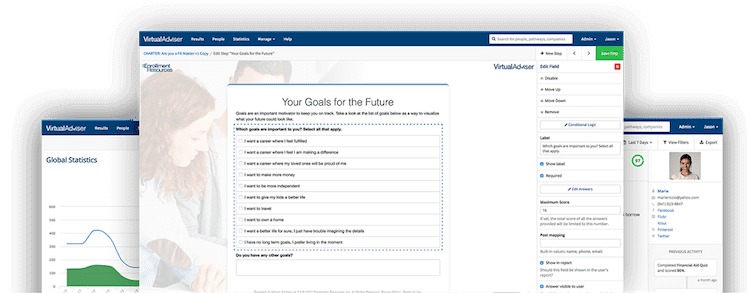Vascular Technologist Program
Go with the leader in allied health training since 1947, at Carnegie Institute in Michigan.
Our online and practical application classes (hybrid training) provide thorough, comprehensive education and working knowledge of required skills and competencies. Develop confidence in small class sizes, one-on-one instruction, and competent, experienced faculty. Find out why medical employers depend on Carnegie graduates.
Vascular Technology students are trained in the performance of non-invasive ultrasound testing procedures. These vascular studies provide essential information regarding the blood supply to and from the tissues of the brain, extremities, and other vital organs and indicate the degree and character of any obstruction.
Non-invasive vascular testing and diagnostic imaging can critically diagnose cerebrocardiovascular disease, neurological disorders, and blood clots. Complications related to diabetes and the prevention and treatment of stroke are also explored.
The Core Curriculum includes the:
- Human Anatomy & Physiology/Pathophysiology
- Therapeutic Communications/HIPAA
- Basic Electrocardiology and Electrocardiography
- Pathology
- Hemodynamics
- Pharmacology as applied to the cardiac and vascular systems
- Ultrasound Physics
- CPR
- Vital signs
- IV Administration
Carnegie VT students are well-prepared
Students will be able to demonstrate an understanding of the principles related to diagnostic ultrasound and Doppler testing procedures. Emphasis is placed on obtaining standard views of vascular structures and accurately providing a preliminary interpretation of arterial, venous, and carotid artery imaging and blood flow.
Is a Career as a Vascular Technologist Right For You?
Take the Free Healthcare Career Training Readiness Quiz!

In only 3 minutes, receive a personalized report identifying your strengths and social style. Learn what training & careers are best for you!
Clinical & Externship Rotation
The clinical/externship rotation is an integral part of the training program. Eligible students are assigned to the school-approved clinical sites by the Program Director. Students will maintain this rotation until all required hours have been completed within the allotted time frame. Site visits to hospitals are conducted regularly by the school clinical site coordinator to assess the student’s satisfactory progress.
Due to the technical nature of this program, a minimum of an associate degree is required. In addition, students must have prior allied health training, recent clinical work experience, and college credits in anatomy & physiology, math, and science.
Career Placement
Upon completing the Vascular Technologist Program, students can perform standard, non-invasive vascular ultrasound testing, demonstrate working knowledge of the principles and instrumentation of vascular equipment, and utilize the appropriate testing protocol.
Vascular Technologists are employed in hospitals, health centers, and vein and specialty clinics. Responsible career entry-level positions with opportunities for advancement await the competent, credentialed professional.
Other Programs Carnegie Institute Offers
- Cardiac Electrophysiology Technologist
- Cardiology Technician
- Cardiovascular Technologist
- Electroneurodiagnostic Technologist
- Invasive Cardiovascular Technologist
- Massage Therapy
- Medical Assistant (Full-Time and Part-Time)
- Medical Insurance Biller
- Vascular Technologist
Publication of Outcome Results
According to the Commission on Accreditation of Allied Health Education Programs (CAAHEP), and the Joint Review Committee on Education (JRC-CVT) Standards, schools must publish outcome results for the following programs: Invasive Cardiovascular Technologist, Vascular Technologist, and Cardiovascular Technologist based on the 2020 Annual Reports Management System.
The published results are consistent with our 2024 JRC-CVT Annual Report. This is a 3-year average for the Vascular Technologist Program (Noninvasive) outcomes in the national credentialing pass rate, retention, and positive placement for 2023, 2022, and 2021.
Average Rate of Graduates who took and successfully passed the RVT national credentialing through ARDMS or the RVS national examination through CCI: 100%.
Average Retention Rate: 92.86%
Average Positive Placement Rate: 100%
Textbooks & Reference Manuals
| Publisher | Title | Author | ISBN | Price |
|---|---|---|---|---|
| Lippincott | ECG Workout Book | Huff | 978-1-4511-1553-6 | $52.79 |
| APRN World | Cardiac Pharmacology, 2nd Edition | Nair | 978-194-100-4128 | $74.95 |
| Elsevier | Anatomy & Physiology, 9th Edition | Patton/Thibodeau | 978-0-3232-9883-4 | $199.00 |
| Elsevier | Introduction to Vascular Ultrasound | Pellerito | 978-1-4377-1417-3 | $129.99 |
| Davies Publishing | Vascular Technology | McPharlin | 978-0-9410-2285-9 | $76.49 |
| E.S.P. | Ultrasound Physics | Edelman | 0-9626444-5-5 | $119.00 |






